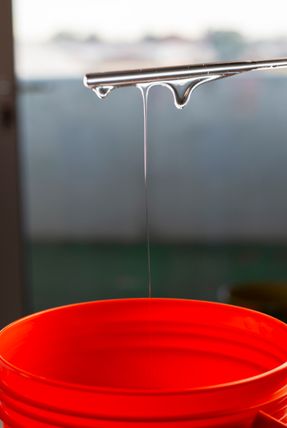Gobbetto Poliepo® GC 503 Lux Resin
POLIEPO® GC 503 LUX RESIN
POLIEPO® GC 503 LUX RESIN
Super-reflecting transparent epoxy resin
Poliepo® gc 503 lux is a two-component glass-effect product, for resin flooring and surfaces.
Applicable also in case of temperatures lower than those allowed for use of the normal poliepo® line.
An epoxy resin compound, non-toxic and solvent-free, offers excellent transparency and resistance to wear and uv rays.
INFORMATION
PRODUCTION
Made in Italy
PRODUCT TYPE
Resins
BRAND
Gobbetto
BINDING TOTAL
100%
DENSITY
About 1100 (g/lt)
SURRENDER FOR DEGA ART
About 1.8 kg/sqm
POT-LIFE AT 20°C
About 25/30min
DRY TO TOUCH AT 20°C
About 16hours
PEDONABILITY 20° C
About32hours
STOCKING AT 20-25°C
About 12 months
CONSUMPTION RESISTANCE
90 N/mm2
QUANTITY
For thick lacquering, using smooth or toothed spatula, a quantity of about 1.2 kg/sqm is recommended. Apply in backlighting to check uniformity and good levelling. Available (kit A + B) in 1.6 kg, 3.2 kg and 16 kg size packs.
USE
Self-leveling product. Mix components A and B: the mixing ratio by weight and 1 part part A and 0.6 part component B ( e. g.1 kg component A e 0.6 kg component B). Pour slowly over the surface then spread with a smooth or toothed spatula. Avoid application on wet days and do not apply at temperatures below 12° C.
FEATURES
The resins constituting poliepo 503 lux have been purposefully selected in our laboratories to avoid showing even the slightest signs of carbonation at temperatures ranging from 12° to 24°c, while maintaining shininess and transparency levels never achieved before with epoxy resins. Poliepo gc 503 lux does not contain reactive diluents with a cresilglidileter base; therefore any eventual dangers related to contact during the application are reduced to the lowest possible. The catalyst, which has an ammine cicloalifatic base, ensures mechanical and chemical resistance as well as being resistant to uv rays, always maintaining transparency.
APPLICATION
- Mix carefully the component a with component b in ratio 100:50 in weight (ex: a=kg.1 + b=kg. 0,5); use a mixing drill at medium speed or a rectangular stick in order to pass well along the walls and the bottom of the can (possibly pour off in another can in order to homogenize perfectly the two components).
- Slowly pour on the surface and help leveling with a smooth or toothed spatula in order to smooth the resin: the toothed spatula can be useful to determine the wished thickness; for example to obtain the medium thickness of 1,5 mm., it is advised to use teeth of 5-7 mm., holding the spatula in an inclined way of 30-40° (once applied, the resin with the toothed side of the spatula, pass on the resin with the smooth side in order to secure a perfect leveling). Some applicators prefer the smooth spatula.
STEP BY STEP METHOD FOR VARNISHING
For the thickness varnishing of dega art floors it is advisable works in two times, doing a first smooth casting and a second at thickness to have a total consumption of 1.8 – 2.0 kg./sqm.
1. Cleaning of the surface
2. Smoothing of poliepo gc 503 lux with smooth spatula. Make sure the resin is carefully mixed with a consumption of about 300 - 400 g/sqm. This casting does not necessarily have to be aesthetic and homogeneous when it comes to levelling, rather it is useful to eliminate the absorbencies and to fix the colours and the decorum. This is to ensure that the second casting, aimed towards aesthetics, will have the best possible results.
3. Varnishing with poliepo gc 503 lux using smooth or toothed spatula, with a consumption of about 1.5 kg/sqm. Always apply resin against the light source (for example a window or a lamp) to verify the homogeneity of the levelling. If necessary, it is possible to nebulize the surface with a diluent using a sprinkler in the areas with micro-bubbles.





